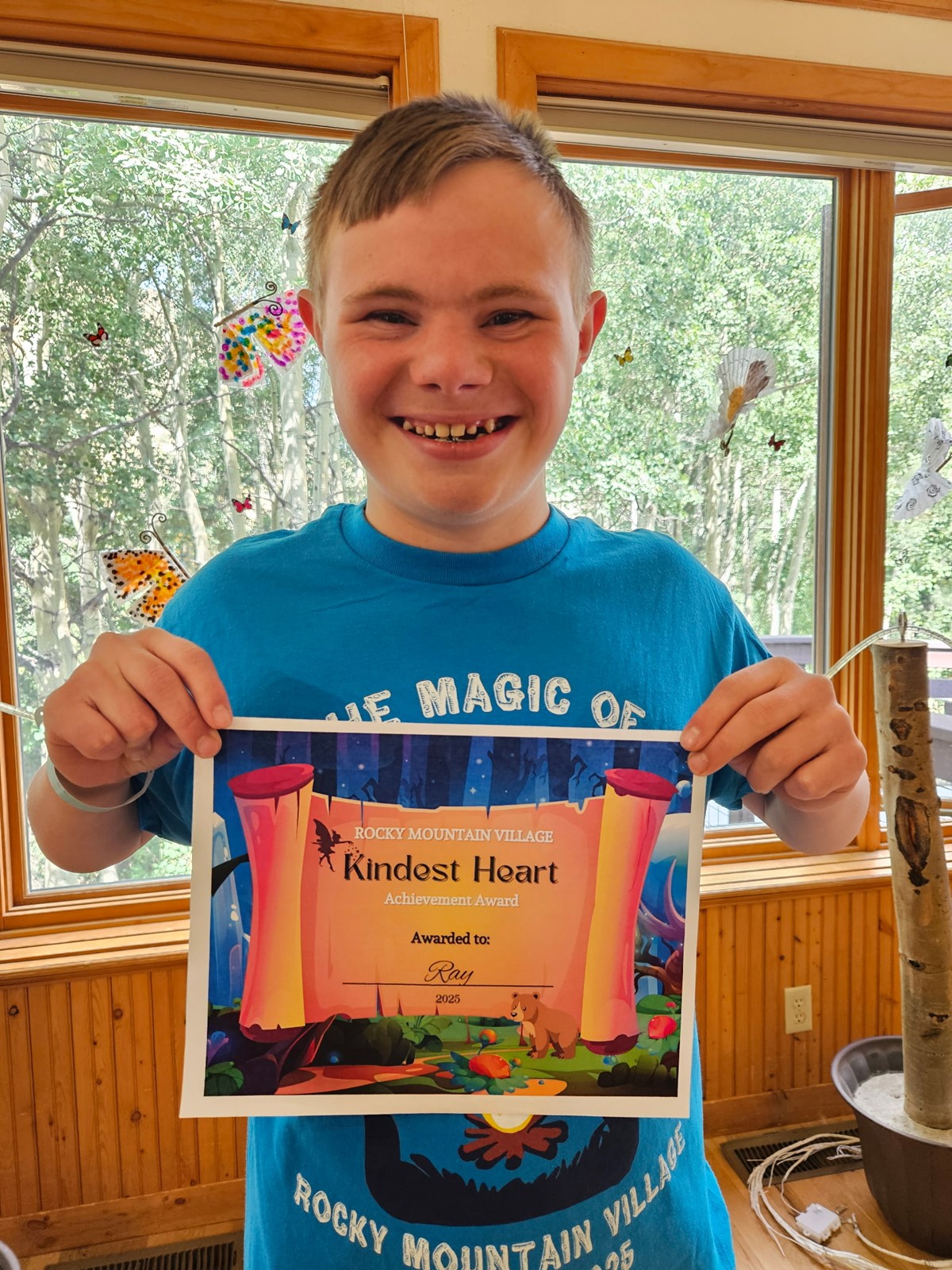
In our culture of self-diagnosing, a recent photo of our youngest son — not “Dr. Google” — helped me name the malaise underway in my life since November: compassion fatigue.
Apparently, this kind of fatigue is another stripe of burnout that creeps up on formal and informal caregivers like high blood pressure — in a silent, corrosive and potentially deadly way given how it depletes a person physically, psychologically and spiritually.
But I really hadn’t come to terms with my crippling condition until my husband shared this image of our son, Ray, 15, beaming as he held the “Kindest Heart” achievement award given to him on the last day of camp by leadership at Rocky Mountain Village — an Easterseals Colorado camp for people with disabilities just off Interstate 70 in Empire.
Then, poof!
Kindness looked alive and well in the sunshine of Ray’s smiling face.
This photo of a celebratory moment — when kindness wins! — refreshed my flagging spirit so much that I’ve studied it many times for inspiration.
Now, I’m convinced we should bring Ray along with us to visit the sick and the dying, because he’s got that secret sauce — the kind of kindness we need when life gets prickly, glitchy and sketchy.
The kind of kindness that sometimes changes circumstances and always can change hearts.
This photo of Ray reminds me to resist the infection of cynicism — to refuse the temptation of letting left turns in failed relationships bench me forever in a dugout of compassion fatigue.
So, I’ve done a post mortem to discover how kindness and compassion could lead me into such unhealthy relational dynamics — from putting up with insults and even mockery during disagreements to cleaning up physical and financial messes left behind by irresponsible adults to tolerating reckless and usurious regard toward others as somehow acceptable.
Looking back, I suspect I catered too much to too many people of these ilks for too long. I tried to respond to their needs. But by late fall I couldn’t imagine ever feeling comfortable sharing space with them again.
Thankfully, none of them are relatives.
Rather, they are people in the community that I could have continued walking with through life had I recognized my symptoms of severe compassion fatigue and modified my daily practice of kindness.
Like my son, Ray, I live from a kind hearted place every day — and that’s such a blessing.
But there’s an art part to kindness — skills to learn around setting healthy boundaries and appreciating the word “no” as a word that lets you say “yes” to something else you might need to survive, thrive and eventually help someone else do likewise.
I now know that caretakers also need ample self-care and nurturing from others to do their best work. And this work must go on as researchers continue linking the intentional practice of kindness as a daily habit with positive outcomes at individual and community levels.
In 2019, The Health and Retirement Study analyzed data collected from 12,998 adults 50 years old and older nationwide to study if changes in volunteering — something often inspired by kindness — were associated with 34 health indicators ranging from physical health (hypertension, cancer, heart disease, obesity, etc.) to health-related behaviors (binge drinking, sleep problems, smoking), and psychosocial well-being (life satisfaction, contact with other family/children, health/financial mastery, etc.).
During the study’s four-year follow-up, researchers noted that participants who volunteered 100-plus hours per year versus zero hours per year experienced a reduced risk of mortality and physical function limitations and heightened physical activity and improved psychosocial outcomes, such as optimism, purposeful living and a positive affect (facial expressions and other body language that convey a positive mood). Robust volunteerism also revealed lowered rates of depressive symptoms, loneliness, hopelessness, etc.
Ongoing research may continue to validate the importance of kindness as something to exercise. It’s another type of cardio workout, if you will.
But for me, there’s nothing better to reboot and recover from compassion fatigue than the kindness of our camp champ holding his “Kindest Heart” achievement award and — in his own quiet way — challenging me to find better ways to walk the talk.
Pam Mellskog can be reached at p.mellskog@gmail.com or 303-746-0942. For more stories and photos, please visit timescall.com/tag/mommy-musings/.


 PREVIOUS ARTICLE
PREVIOUS ARTICLE
